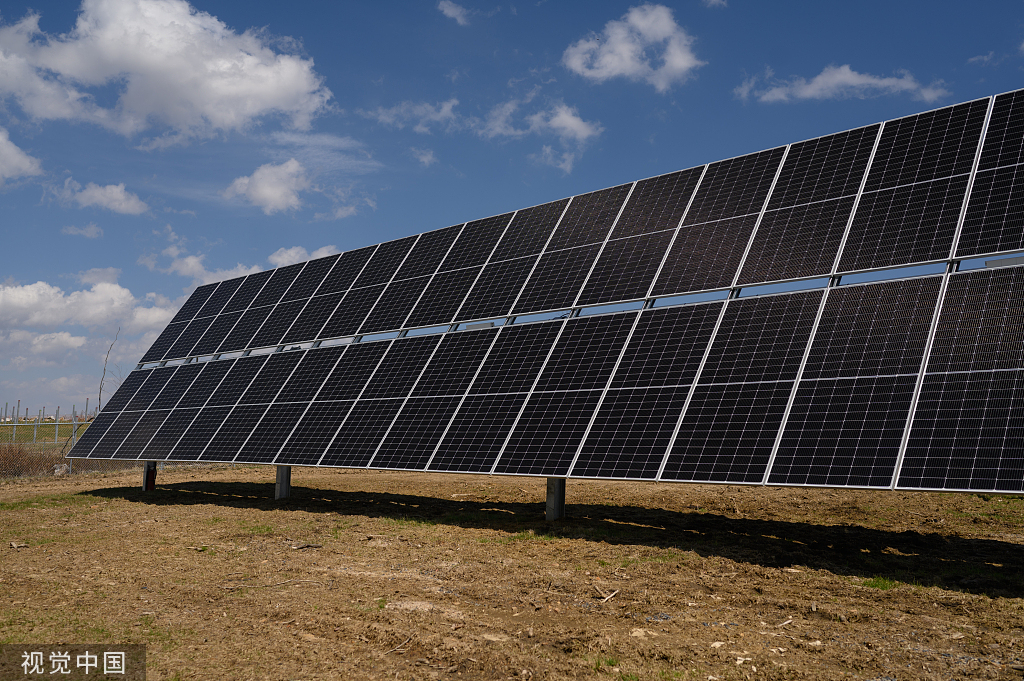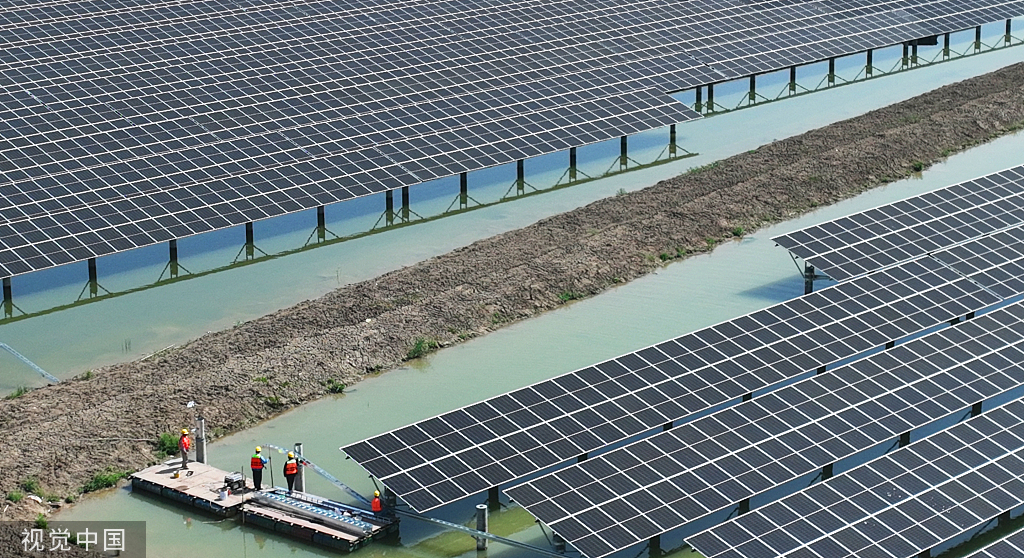Compromise with American companies? Biden administration will impose tariffs on China this time or will exempt photovoltaic equipment.
[Text/Observer Network Yan Shanshan] On May 13th, Bloomberg quoted people familiar with the matter as saying that the Biden administration will announce this week that it will impose new tariffs on key strategic industries such as electric vehicles, among which the tariffs on electric vehicles in China will be raised from 27.5% to 102.5%, and other industries will be doubled or tripled.
However, while American companies continue to express their concerns about the possible impact on the photovoltaic industry and warn that tariffs will further weaken the importance of the United States in the clean energy supply chain, sources said that the Biden administration has sent a signal to the US photovoltaic industry that it will exclude products such as production equipment for solar panel components from this tax increase.
Bloomberg said Biden’s plan to impose new tariffs on China was mainly "symbolic" because the targeted industries in China did not depend on American consumers. The White House has not responded to this matter at present.
In response to Biden’s administration’s intention to impose new tariffs on China, China’s Foreign Ministry said on May 10th that it urged the US to abide by WTO rules, cancel all tariffs imposed on China, and even refrain from increasing tariffs.

On April 25, 2022, local time, the solar panels of a solar power plant under construction in Portage, Pennsylvania, USA. (Source: vision china)
With the approaching of the US presidential election in November, the political needs of candidates and the anxiety of the United States towards China are increasingly revealed. Democratic candidate Biden and Republican candidate Trump have shown tough stance towards China.
Bloomberg said that after nearly two years of evaluation and review of existing tariff policies, Biden will announce an increase in tariffs on China in target industries this week, which he claimed was aimed at protecting American workers.
According to people familiar with the matter, the Biden administration will raise the tariff on electric vehicles in China from 27.5% to 102.5%. Other target industries will double or triple their tariffs on China. The specific increase rate is not clear at the moment, and it is not clear which goods are excluded. But what is certain is that Biden will not announce any measures to reduce tariffs this time.
According to a person familiar with the matter, Biden and his aides have only finalized the above measures in recent weeks, including which industries need to be suppressed and which key industries that promote US economic growth should be excluded. Finally, the Biden administration reached an agreement.
According to two people familiar with the matter, Biden’s government has sent a signal to the US photovoltaic industry that it will exclude products such as solar panel assembly production equipment from this tax increase.
According to the report, American solar equipment manufacturers have been seeking this exemption, and they warned that the current tariffs weakened the United States’ efforts to compete with China’s clean energy supply chain.
This latest "exemption" rumor reminds people of Biden’s decision last year to continue to implement tariff exemption for photovoltaic products in four Southeast Asian countries. In May last year, Biden vetoed a new bill of the US Congress asking the US government to end tariff exemption for photovoltaic products in Cambodia, Malaysia, Thailand and Vietnam.
Biden said at the time that he did this because the United States could not afford the new uncertainty brought by this to American enterprises and workers in the photovoltaic industry, and the United States would continue to focus on expanding American production capacity to strengthen American energy security.

On May 13th, 2024, in Lianyungang, Jiangsu Province, Dunshang Town, Ganyu District, the fishery and light complementary photovoltaic power generation project is stepping up construction. (Source: vision china)
On the issue of tariffs on China, both Biden and Trump tried to use tariff weapons to attack China in key industries. For example, the two parties recently formed a "consensus" on suppressing electric vehicles in China. The only difference is that Biden followed most of the tariffs of the Trump administration and tried to raise the tariffs of target industries; Trump is seeking to increase tariffs on goods from China in general, and advocates to increase tariffs on electric vehicles from China even more. The latter is suspected to be too radical and will lead to inflation.
On May 11th, local time, Trump claimed at a campaign rally in New Jersey that if he was re-elected to the White House, he would impose a 200% tariff on cars made in Mexico by China enterprises, and threatened to impose a 60% tariff on all goods in China.
Bloomberg reported that Biden’s plan to impose new tariffs on China is mainly "symbolic", because China industries included in the tax increase scope do not depend on American consumers. Many years ago, China’s electric vehicles were blocked from the American market because of tariff barriers, while photovoltaic companies mostly exported to the United States through other countries to avoid similar restrictions.
Greta Peisch, former chief trade lawyer of the Office of the US Trade Representative and a partner of Wiley Rein LLP, a Washington law firm, said that the Biden administration has been "paying attention to industries with long-term concerns", and these measures are aimed at dealing with specific activities and risks, avoiding escalation, and maintaining the relationship between the United States and China "beyond these key products".
Paishi said that the Biden administration’s approach reflects its goal of "aiming at China while maintaining US-China relations". "This is strategic, not a comprehensive upgrade, but a response to China and support for the affected American industries."
The White House has not responded to the imposition of new tariffs on China.
According to people familiar with the matter, Biden will target key industries such as electric vehicles, batteries, solar cells, steel and aluminum. Last month, Biden smeared China with the so-called "overcapacity theory", saying that he would raise the average tariff rate on steel and aluminum products in China from 7.5% to 25%.
According to Bloomberg, Biden’s move is not so much aimed at cracking down on market segments as at preventing the expected import growth: China’s steel, aluminum and automobiles currently account for only a small part of the US supply chain.
For a long time, the Biden administration has been exaggerating the so-called "threat" of China products, claiming that China is promoting "monopoly on key industries" and speculating that China’s "subsidized goods" will enter the US market in large quantities. While the United States is implementing the Inflation Reduction Act and seeking economic decarbonization, it constantly accuses China of "overcapacity" in the field of new energy.
In this regard, China Foreign Ministry spokesperson Wang Wenbin said in April that the capacity of China’s new energy industry is an advanced capacity urgently needed to promote green development, not an excess capacity. According to the calculation of the International Energy Agency, in order to achieve the goal of carbon neutrality, the global sales of new energy vehicles need to reach about 45 million by 2030, 4.5 times that of 2022, and the demand for photovoltaic installed capacity also needs to increase substantially. The key problem facing the world today is not the overcapacity of new energy, but a serious shortage. The rapid development of new energy industry in China conforms to economic laws and market principles, not the result of subsidies. It is hoped that the countries concerned will keep an open mind, earnestly abide by the principles of market economy and international economic and trade rules, and provide a fair, transparent, open and non-discriminatory business environment for China enterprises.
Regarding the Biden administration’s decision to impose new tariffs on China’s key strategic industries, Foreign Ministry spokesperson Lin Jian said at a regular press conference on May 10th that the previous US administration imposed tariffs of 301 on China, which seriously interfered with the normal economic and trade exchanges between China and the United States and was ruled by the WTO to be in violation of WTO rules. Instead of correcting the wrong practices, the United States continues to politicize economic and trade issues, abusing the so-called 301 tariff review procedure, and wants to further increase tariffs, which adds to the mistakes. China urges the United States to abide by the WTO rules, cancel all tariffs imposed on China, and must not increase tariffs. China will take all necessary measures to defend its own rights and interests.
This article is an exclusive manuscript of Observer. It cannot be reproduced without authorization.